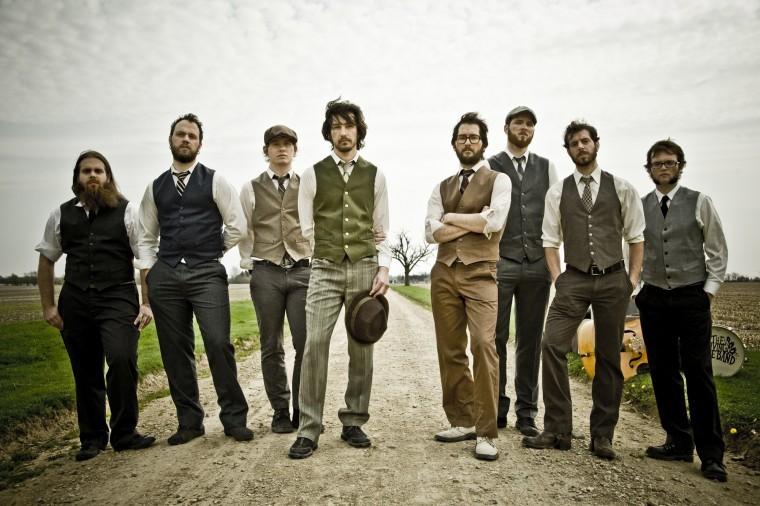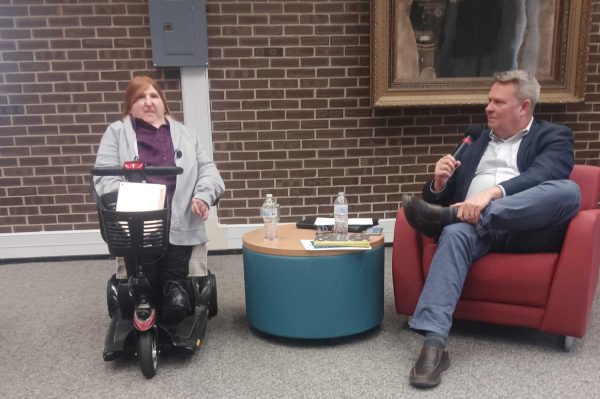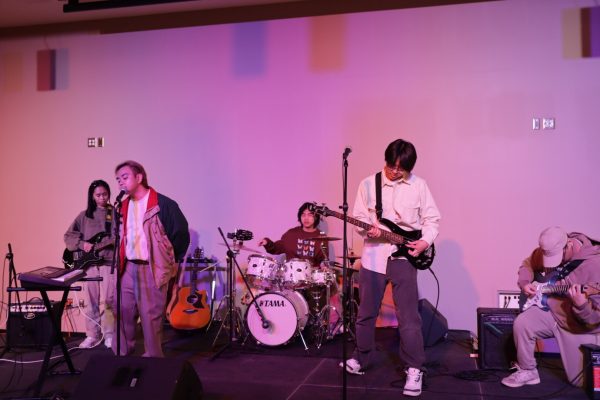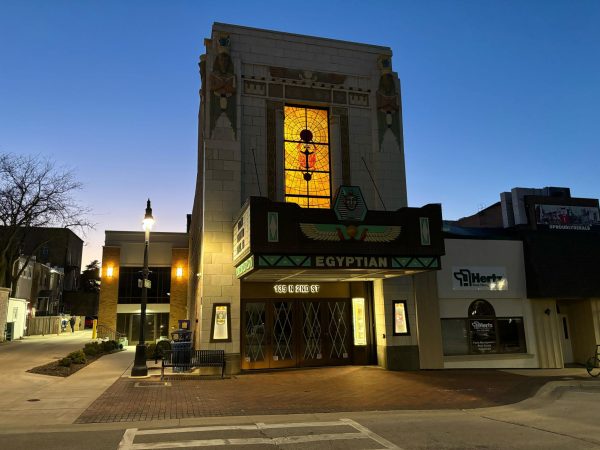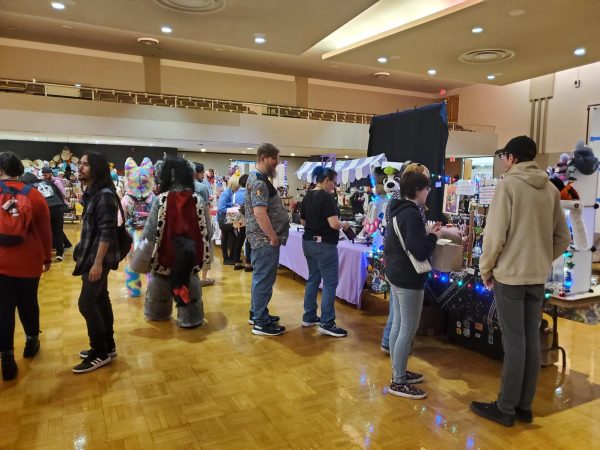The Giving Tree Band to folk up DeKalb
Folk-rock sensation The Giving Tree Band will hit The House Cafe this Friday night at 9 p.m. The band encourages everyone to wear their pajamas.
October 5, 2010
The Giving Tree Band produces a sound unlike any other by combining bluegrass and rock elements.
This Yorkville-based band is comprised of eight members-two of which are NIU alum (Andy Goss and Erik Norman). GTB already has three albums under it’s belt, with the newest to the list, “The Joke, The Threat, & The Obvious” having been recently released. The Northern Star was lucky enough to sit down with banjoist Todd Fink, one of the two brothers who formed the band, before their show at 9 p.m. Friday at The House Cafe, 263 E. Lincoln Highway.
Northern Star: How would you describe the folk scene here in northern Illinois?
Todd Fink: I think there’s a pretty rich tradition here in Northern Illinois. I know there’s a lot of bluegrass artists and even some of our families are connected to it a little bit. Erik Norman, our mandolin [player], his father played a lot of folk music out here and has even played here at The House [Cafe]. We’ve even had another guy named D.K., he’s a pretty well-known folk artist out here, he’s played slide guitar on some of our recordings before Crooked Creek, our record label. So yeah, I think there’s a pretty good tradition here … a pretty good folk scene. We’ve played with other artists; we also have another group of guys from Northern called the Cerny Brothers come put to our studio and record a little bit with our band back in … they’re pretty talented folk artists that went to Northern. So yeah, it seems like we’ve come across a lot of folk artists and a pretty good scene. All of us are from northern Illinois in the Giving Tree Band.
NS: What’s the chemistry of the band like with eight members?
TF: It’s interesting, but we are really great friends-so it works. I think that if there wasn’t that genuine friendship and camaraderie, it would be difficult to have a band that size. We’re all really close, we live together, we work together, we travel together, so when we call ourselves a band, it’s almost like calling ourselves a family. I think that closeness and that friendship and that positive energy is expressed really well in concert. I think people feel that and that’s what’s exciting about the live show. I know for us, since there’s already eight of us, everywhere we go out it, it feels like a party, so we always have fun.
NS: Your website mentions “virtue” and “virtuosity” a lot. Could you explain that a little bit?
TF: I just think it’s a little bit of a different take on virtuosity. Now, I find that people throw that word around a lot. Conventionally it applies to an artist that has a high level of mastery and technical ability over his instrument, but a lot of times that is not everything in music or creativity. I think imagination is really important. When I think of the definition, I tend to focus more on the root word-virtue-and think how can those virtues be embodied by music? Virtues like integrity, honesty and things like that … simplicity, meaning, purpose. We try to put all that into our songwriting. We try to play for the song. We try to be as humble as possible when we’re writing parts to ourselves. We try to sacrifice our egos as much as possible. I think that’s also a kind of virtuosity-it’s a little bit different interpretation, but I think it’s equally as valuable to strive for as an artist as just mere speed and technical ability.
NS: Being from northern Illinois yourself, what are you looking forward to the most when playing here?
TF: We played here before-we had a sold-out show here at the beginning of the year in February. I think we’re just excited to play here this time-we played at Otto’s before. I think the House just has a really warm, comfortable atmosphere, and we are making it a pajama party. We’re inviting people to wear pajamas. So, this is something we’ve done before in DeKalb, but this is something that we’ve only done in DeKalb. So it’s sort of like our way of making our concert special for NIU and students here. I think because we really appreciate our fanbase here, and we just wanted to make it as special as we can and let them know how much we appreciate them. Even though we travel all over the country, this is the only place we’ve ever done [the pajama party]. And we’ll wear pajamas and people will come in pajamas and it’ll be fun-it’ll be memorable. It’s genuine-we genuinely feel a lot of love from the community here, and we want them to know how much that means to us.
NS: How would you describe the unique style of your band? Simply labeling it folk doesn’t seem to do it justice.
TF: No, not really. I think the folk aspect is that we have acoustic instruments link banjo and mandolin. So, we have some bluegrass instrumentation, too-I think that is the connection to folk music. But our songwriting draws from a lot of influences like classic rock, classic rock ‘n’ roll and the Beatles and some contemporary stuff even. I think our band is more a rock ‘n’ roll band than a bluegrass band or a folk band even. And I think we get louder than any folk band, so it’s limiting, I think to a great extent. But it’s hard because it’s like “what do you call us?” It’s not rock, like you might think of in terms of like alt-rock like Pearl Jam, Nirvana, stuff like that; it’s not electric and heavy, but it’s still loud. I guess it’s a kind of roots-oriented type rock ‘n’ roll sound, but I think it’s its own thing. I really don’t think there’s much else like it right now. I do think that there’s other people making amazing music with acoustic instruments, but I think we do have a sound that is pretty much all our own right now because the band is so big and because there’s so much diverse musical experiences of the members. Phil Roach, our violin player, was a member of the Illinois Symphony Orchestra-so we have… an orchestral approach to some of our songs. And also, our sound’s always evolving so it’s just very difficult to categorize, but I think that’s normal nowadays.
NS: I’ve heard that you guys are one of the greenest bands in America-could you explain that a little further?
TF: That was never something we were thinking of trying to be, but we were always conscious of doing what we could when creating our music and touring. It’s surprising and amazing and humbling that all of those efforts have been appreciated by the people and are making a difference on a larger scale. Some of the green initiatives that we have in our band and our business include playing instruments that are made from reclaimed woods and naturally fallen trees-not all of our instruments, but a lot. We have a drum kit made of bamboo. We tour with biodiesel. We use renewable energy when engineering recording sessions. We package all our CDs with 100 percent recycled post-consumer material. We use veggie inks for printing-we just do what we can. We try to be creative, too, and think of new ways to do things and to inspire other artists because I think we are in a unique position as artists to influence and inspire others-both other artists and also the community at large. So that’s always been important to us. We feel like it’s a fulfilling way to do things … as artists. It’s not a gimmick and it’s not to get any particular award, it simply brings more meaning, more joy, more fulfillment to us as artists. We try to donate as much as we can of our proceeds to non-profit organizations, eco organizations and charities.
NS: “The Joke, The Threat, & The Obvious” was recently released. How, if at all, would you say this album is different from your others?
TF: It’s different because there are more members. This is the first album that features all eight members of the band. So, the sound is a little bit fuller; it’s a little bit more rock ‘n’ roll. In a lot of ways, we feel it’s like the first record because we now have the band in its final form. In the other two records, the band was a four-piece band and with the goal of expanding to more members. So now we’ve achieved that, and we made an album so it’s a new sound a little bit-a little bit of an evolution and departure from some of the earlier material, but we’re really excited about this new direction.
NS: How was the name for your band decided upon? Was it just that book by Shel Silverstein (“The Giving Tree”)?
TF: I think the book works for us on multiple levels. Shel Silverstein was also a musician-a folk artist-and he’s from Chicago, so there’s that connection. He wrote a lot of songs that were popularized by other artists, for example: he wrote “A Boy Named Sue” that Johnny Cash made famous. So sort of a small tribute to Shel Silverstein. The book … I feel like the title sort of embodies the combination of music and environmentalism that‘s also integrated into our artistic approach. So, I think it works on multiple levels. I think there were some times when we were just like, “I don’t know if that’s a good name or not,” but after a while, you just run with it. It’s a very inspirational book-I still get inspired by it when I read it once in a while. I think a lot of artists are making music or creating to be happy. I think in our band, everybody’s pretty much already happy. And so we’re making music and touring and taking it to other people to give-so I think that’s why the name works also. For us, we’re doing it to share with other people-we’re not doing it so much to get something out of it, although this life is a wonderful life and every moment is rewarding, but I think in our band, pretty much everybody is already feeling very positive and very happy in their life.



